C.M. Simpson's Blog, page 159
December 14, 2015
Progress Report: Week 2, December 6-12, 2015
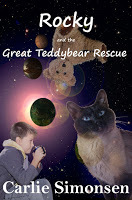 And this week, I changed things up again. While I was getting the words down, last week—and having a blast—I wasn’t catching up with the publishing schedule. There’s little point in getting the words down, if you’re not also getting them out to readers… so I rejinked my work habits, yet again. I’m not sure what the outcome of this rejinking will be. So far, I’ve managed to reincorporate the exercise and get the publishing process properly started, but I’m still working on adding the writing back in so some gets done every day. Words done this week were all written on Monday, Tuesday, Friday and Saturday. The rest of the week got lost in publishing, editing, and personal administration. I’m getting there, but it’s not as easy as it sounds.
And this week, I changed things up again. While I was getting the words down, last week—and having a blast—I wasn’t catching up with the publishing schedule. There’s little point in getting the words down, if you’re not also getting them out to readers… so I rejinked my work habits, yet again. I’m not sure what the outcome of this rejinking will be. So far, I’ve managed to reincorporate the exercise and get the publishing process properly started, but I’m still working on adding the writing back in so some gets done every day. Words done this week were all written on Monday, Tuesday, Friday and Saturday. The rest of the week got lost in publishing, editing, and personal administration. I’m getting there, but it’s not as easy as it sounds.Overview
New words produced: 10,615Old words revised: 0Outlines and Notes: 0Works completed: 15 (14 for inclusion in four other collections, 1 stand-alone)Works revised: 1Covers created: 1Works published: 0Works submitted: 0Competitions Entered: 0Bloggery: 0University Prep and Assignments: 0
Back-on-Track Challenge:
Design covers for, edit, format, and upload the following:
Annual25A—C.M. Simpson: Short Stories and Poems from 2014, Vol. 1: pre-nuke edit continues;ShortStory479—Miss Delight’s Mistake: Now scheduled for publication in August 2016, was originally scheduled for September 2015.Chapbook5B—Rocky and the Great Teddybear Rescue: Cover completed, pre-nuke edit completed, CreateSpace edit and format almost complete;
Finish
Annual27—366 Days of Poetry had poems added for July and DecemberAnnual28—366 Days of Flash Fiction had flash fiction added for March and December.
New Writing
Chapbook5E—Rocky and the Spacefarer’s Christmas (December 2015) – Completed first draft on 20 August 2015, and moved to: Design covers for, edit, format, and upload section.Chapbook5B—Rocky and the Great Teddybear Rescue: completed and moved to the ‘Design covers for, edit, format, and upload’ section;Chapbook5C—Rocky Rides the Space Range: outline completed, writing to commence;
Publishing Tasks
Created 0 blog posts for this blog;Created 0 blog post for the C.M. Simpson Publishing blog;Created 0 blog post for the C.M. Simpson Art and Photography blog;
New Arrivals
The following pieces arrived last week and were completed:
Poem696—Allies in the Deep Night: a fantasy poem about an unlikely alliance against trolls;Poem697—A Sleeper Agent’s Regret: a science fiction poem about an invasion;Poem698—December’s Here: a reflection on the December time of year;Poem699—Lunar Vigil: a science fiction poem about the return to Lunar Base 1 by one of the original Earth refugees – set in the Hummingbird and Lunar Wolves universe;Poem700— Fast-Lane Choices : a poem reflecting on the choices in modern life—and the sacrifices;Poem701—The Kidnapper’s Fate: a fantasy-horror poem about not messing with werewolves;ShortStory622—Burbreen Eternal: a piece of horror flash fiction about soldiers facing a terrible foe;ShortStory623—Home by Dawn: a piece of speculative flash fiction about werewolves, territory, and mum;ShortStory624—Wraith Light: a piece of speculative science fiction about wraiths and colonisation;ShortStory625—Living the Dream: a piece of speculative flash fiction about careers and dreams;ShortStory626—Family and the Fey: a piece of urban fantasy flash fiction set in the Australian outback;ShortStory627—Career’s End: a piece of flash science fiction about living the dream—and what it takes to get there;ShortStory628—Eviction and Eradication: a piece of flash science fiction linked to Career’s End; ShortStory629—Pink and Fluffy: another piece of flash fiction, this one about parasites and cushions…;
Published on December 14, 2015 09:30
December 13, 2015
Heinlein’s Rules, Learning and Writing
Recently, Dean Wesley Smith blogged about Heinlein’s Rules and learning from them. He listed the rules, and I had to think about what they might mean for me, and for my writing. And this is also a very important part of learning, another point on which I agree with Dean—and another point on which he blogged recently. So, what did I think? Well, here are my initial responses:
#1 You must write. Totally Agree. You must write. If you do not write, you have nothing to sell.#2 You must finish what you write. Absolutely: If you do not finish what you write, you have lots of writing, and still nothing to sell.#3 You must refrain from rewriting except to editorial order. Not so sure about this. Yes, I write one draft and I tend not to redraft, so I agree here. No major rewrites. However, since I’m my own editor, it’s me who gives the orders—as well as any beta readers I’ve found… I have to be careful, or the edit-rewrite thing could get very circular. So, no, I don’t rewrite the story, but I do go back as an editor and pick out inconsistencies, over-used words, and slow patches and I dorewrite those. I also do a little polishing as I go. Having said that, I don’t tend to do more than four of five editorial passes when I’ve finished, and then I put the story out, and I tend not to look back.#4 You must put it on the market. Absolutely. Yes. If you do not put it on the market, it will not sell. So, when you have done the best you can on the story, put it out on the market. On as many markets as possible, and then get on with the next one.#5 You must keep it on the market until sold. I think this refers to when a story was sent out again, and again, and again, until a magazine or publisher bought it. I’m not so sure what it means nowadays, but I think it means for an indie, that you put it out there and leave it there to sell.It will be very interesting to see how Dean interprets these rules for the new world of publishing, and whether or not I’ve missed something, which is likely. I’m still learning. I’m thinking there’s more I can add to my understanding of these rules, and probably more for you, too. If you’re interested in following Dean’s discussion, you can find the first two chapters HERE.
Published on December 13, 2015 09:30
December 12, 2015
Progress Report: Week 1, December 2015 (29 November—5 December)
So, two weeks ago, I headed into the writing, with the aim of working my way down the release schedule, and then adding releases in as they could be managed. It went pretty well.
Overview
New words produced: 10,815
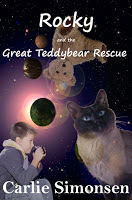 Old words revised: 0Outlines and Notes: 0Works completed: 49 (all for inclusion in two separate collections)Works revised: 0Covers created: 0Works published: 0Works submitted: 0Competitions Entered: 0Bloggery: 180University Prep and Assignments: 0
Old words revised: 0Outlines and Notes: 0Works completed: 49 (all for inclusion in two separate collections)Works revised: 0Covers created: 0Works published: 0Works submitted: 0Competitions Entered: 0Bloggery: 180University Prep and Assignments: 0Back-on-Track Challenge:
Design covers for, edit, format, and upload the following:
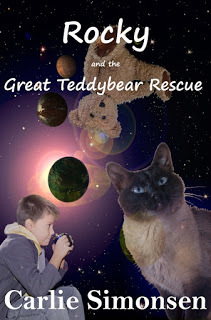 Chapbook5E—Rocky and the Spacefarer’s Christmas was successfully released on 4 December 2015.YANovel26—Pyrie(August 2015) – Completed but not published: 27/08/2015ShortStory474—Hammer and the Trolls (August 2015) was successfully released in August 2015ShortStory480—Tischa’s Rescue: No longer under submission. Now scheduled for release in June 2016. ShortStory488—In Service to the Pinnacle: No longer under submission. Now scheduled for release in April 2016, it was originally scheduled for January 2016.ShortStory493—A Legacy of Elves: No longer under submission. Now scheduled for release in February 2016, it was scheduled for release in April 2016 All other short stories are currently under submission; they will be scheduled for release as they become free to be scheduled.
Chapbook5E—Rocky and the Spacefarer’s Christmas was successfully released on 4 December 2015.YANovel26—Pyrie(August 2015) – Completed but not published: 27/08/2015ShortStory474—Hammer and the Trolls (August 2015) was successfully released in August 2015ShortStory480—Tischa’s Rescue: No longer under submission. Now scheduled for release in June 2016. ShortStory488—In Service to the Pinnacle: No longer under submission. Now scheduled for release in April 2016, it was originally scheduled for January 2016.ShortStory493—A Legacy of Elves: No longer under submission. Now scheduled for release in February 2016, it was scheduled for release in April 2016 All other short stories are currently under submission; they will be scheduled for release as they become free to be scheduled. Finish
Annual27—366 Days of Poetry: completed through to July.Annual28—366 Days of Flash Fiction completed through to February.Annual26A—C.M. Simpson: Short Stories and Poems from 2015, Vol.1: Due to changes in content, this volume will be retitled C.M. Simpson: Short Stories and Poems from 2015 and 2016, Vol. 1 , and it’s release date moved to October 2017. Release date was December 2016.Annual26B—C.M. Simpson: Short Stories and Poems from 2015, Vol. 2 Due to changes in content, this volume will be retitled C.M. Simpson: Short Stories and Poems from 2015 and 2016, Vol. 2 , and it’s release date moved to November 2017. Release date was December 2016.Annual26C—C.M. Simpson: Short Stories and Poems from 2015, Vol. 3 Due to changes in content, this volume will be retitled C.M. Simpson: Short Stories and Poems from 2015 and 2016, Vol. 3 , and it’s release date moved to December 2017. Release date was December 2016.
New Writing
Chapbook5B—Rocky and the Great Teddybear Rescue: Writing commenced
Publishing Tasks
Created 1 blog posts for this blog;
New ArrivalsThe following pieces arrived last week and were completed:
Poem654—Lift-Off: an acrostic about the hopes embodied in starships;Poem655—Public Servant Rivalries: an alphabet acrostic about the public service;Poem656—A History of the Heart: a fantasy alexandrine about the founding of a kingdom in a battle’s aftermath;Poem657—Draconic Attack Run: a fantasy-based Crapsey-style cinquain about dragons attacking;Poem658—Terror’s Alternative: a speculative poem exploring terrorism;Poem659—Dark Choices, Dark Tears: another speculative poem exploring terrorism and posing a challenge;Poem660—If the Dragon Calls: a fantasy poem about old age, dragons and obligations;Poem661—The Storm Wind’s Theft: a speculative poem about grief, loss and the winter wind;Poem662—The Protector’s Wish: a dark fantasy poem about sacrifice and love;Poem663—Fairies in the Night: an urban fantasy about fairies;Poem664—Crocodiles and Me: a speculative poem about crocodiles;Poem665—Pixies at Midnight: an urban fantasy poem about pixies dancing at midnight;Poem666—The Unicorn Convention: an urban fantasy poem about bloodthirsty unicorns; Poem667—Desperate Flight: a series of reverse cinquain on fleeing with haste;Poem668—I Live for the Seasons: a poem about the joys of each season;Poem669—Starship Dreaming: a poem about starships leaving this world’s orbit;Poem670—Hummingbird Memories: a poem set in the hummingbird universe;Poem671—Mermaids and Unicorns: a poem about the rivalries of legendary creatures;Poem672—The Survivor’s Condemnation: a poem about a survivor meeting a rescuer who has arrived too late;Poem673—An Apocalypse is an Apocalypse: a poem for two voices about two different apocalypses;Poem674—Hunter at the Disco: a poem about the dangers of vampire hangouts;Poem675—Fantasy, Science Fiction, Horror and the Deeds of Man: a poem about the place of stories in everyday life;Poem676—Monday the Thirteenth: a poem about the number 13 and Mondays;Poem677—Fighting the Wolves: a poem about werewolves;Poem678—Earth-Dawn Yearning: another poem set in the hummingbird universe;Poem679—A Fatal Persistence: a poem about the meaning of ‘no’;Poem680—The Creation of Wolves’ Dean: another poem about werewolves, this one more sympathetic;Poem681—The Hero’s Price: a sonnet-like fantasy poem about who pays the price for heroic actions;Poem682—Mightier than Dragons: a series of fantasy verse comparing various creatures of legend to dragons;Poem683—The Troll Bridge: an urban fantasy poem about a troll bridge;Poem684—The Nightmare Beneath: a fantasy poem about the threat posed by hobgoblins;Poem685—Alliance of Light: a fantasy poem about different mounts and the forces of good that ride them to battle;Poem686—The Battle Overhead: a science fiction poem about what a space-borne battle might look like from the ground over which it is fought;Poem687—Quandaries of War: a speculative poem about war, politicians and politics;Poem688—Thoughts on Chocolate: a speculative poem about chocolate…;Poem689—Battling Dragons: a series of abbreviated haiku describing a battle against invading dragons; Poem690—King Ruford’s Peace: an abecedarium about war and peace;Poem691—Basilisk Dreaming: an acrostic about basilisks;Poem692—Starry-Eyed Dreamers: a science fiction poem, written in the Irish ae freislighe form, about hoping for a better future among the stars;Poem693—Helping Nature’s Balance: a science fiction poem based loosely on the Alexandrine form, about helping nature balance itself;Poem694—Last Minute Repairs: a poem about emergency repairs;Poem695—Basilisk Hunt: a fantasy poem about the dangers of hunting basilisks;ShortStory615—If Bananas Were Purple: a piece of flash science fiction about bananas;ShortStory616—Coming Home: a piece of flash dark urban fantasy fiction about vampires;ShortStory617—Crickets: a piece of flash thriller fiction about data retrieval;ShortStory618—Insurance Chip: a piece of flash science fiction about a data chip;ShortStory619—Fire Starter: a piece of urban fantasy about a fire starter;ShortStory620—Fey Shenanigans on the First of December: an urban fantasy flash fiction piece about elves, trolls and policing.ShortStory621—Fertiliser and Fresh Food: a piece of science fiction flash about corporate rivalry.
Published on December 12, 2015 16:50
December 7, 2015
Writing Life: Contemplation
I read a lot of things as I try to work out how this whole indie thing works, and I keep coming back to a few of them, because they remind me what it’s all about, and that gives me the courage to continue chasing the dream.
So, when one says write what you love, and don’t let chasing a market dictate, I listen – and then I assess what I’m doing. Am I writing poetry and flash fiction because it’s the latest market? Do I write romance for the same reason? What about the science fiction? The fantasy?I took a long, hard look, and decided perhaps, I didn’t. The poetry and flash fiction, the short story collections and short stories, they don’t sell very well. From a business point of view, perhaps I should stop writing them… but I won’t. Not because I hope for discovery, but because it would hurt to stop. I like writing poetry – it’s the challenge of it. Poetry is hard to get right. And I like writing flash fiction; it’s hard to get a story in less than a thousand words. I also like short fiction, because it gives me a chance to explore new worlds, or aspects of old ones.I think I’m in trouble, here, and not just because of the fascination with these types of writing that don’t sell well, but because I like writing a lot of different things. I like writing science fiction, fantasy, young adult, teen, adult, and romance, and I like trying my hand at new styles of writing – that’s what makes it fun for me. And, as I look around, I find I’m not alone. There are lots of writers writing across styles… and, yes, across genres, and more that write short, as well as long. I’m in pretty good company.I remember a piece of advice about the amount of time it takes to ‘break out’ and start making a living, and how some genres take less time, such as romance or erotica, and some take longer, such as fantasy and science fiction. Types of fiction also affect the time: poetry, for instance, takes longer, if it breaks out at all, novels take less. And then there’s the amount of time it takes for an author writing under a single writing name to break out, which can vary, but which takes longer if the author is writing under more than one name, and I find myself strangely content.Because, it’s true: apart from a lucky few who make it big early, most writers are going to take five to ten years, and that’s writing under one name. I write under more than one, and writing short pieces and poetry, and I haven’t done everything exactly right, so I’m probably looking closer to the ten end of things, if not fifteen. I’m sitting at four, now, and it’s probably time to up my game, starting with setting up a proper release schedule, and meeting it, having regular releases for each pen name, and writing more, a lot more – and I’m starting to have fun.Maybe I won’t go back to the day job… and the idea of that feels kinda weird, and kinda good and kinda scary, all at the same time.
Published on December 07, 2015 09:30
November 30, 2015
Lessons from NaNoWriMo 2015
This year, in spite of knowing I had exams in the first part of November, I entered NaNoWriMo. Now, usually, I bomb out and don’t complete my 50,000 words, and this year, I wanted to get started on a 90,000-word novel, but I was busy with study and kids and housework, so, when November 1 came around, I had nothing in my head… and I started writing anyway—and I’m very glad I did.
For a year now, I’ve been toying with the idea of going full-time with my writing, and I had no idea of what that might entail, or how I might go about it, or even if I could. I knew it was something I wanted, but I’d planned it for my retirement. With events last year culminating in my then supervisor forcing me to choose between completing the degree I had work permission to start, or working while being denied the working conditions I was entitled to, and which would enable me to complete my degree.
I’m still doing my degree, and that’s been hard, and I’ve been lucky to have my family’s support, for there were times when my faith in myself and my chances of future employment was very, very low. I spent most of the year trying to keep up my writing and trying to study, and doing an okay job at both. I entered the university summer break determined to study languages, study some of the stuff I’d need to know in order to get grades next year, AND to write.
So, when NaNoWriMo started, I jumped in with nothing in my head, and began writing. At first I aimed at 2,000 words a day, and then I took five days off for exams and studying for exams. After that, I decided I needed to write 3,000 words a day—and I did that for most days.
I was comfortable with writing 2,000 words on a single project, and I found 3,000 words on one project a stretch, but it got easier, especially once I’d written a partial outline to help keep me on track—which happened at the 10,000-word mark. On the 20th November, I decided I might see what it would look like if I gave being a full-time writer a go.
I dropped the extra study, and cut my language study back to a minimum, and I discovered it didn’t bother me as much as I thought it would. And I started to organise my writing day, so I could get the writing done, as well as organise the publishing side of things. It took me a week to make enough time in the afternoon to start to be able to the administrative and editorial side of things, but it happened, and NaNo was part of the process.
Did NaNo teach me how to organise my day? No, but it gave me a reason to write a set amount, and then another reason to write more on one project than I was usually comfortable doing. It taught me that I could , if I set my mind to it.
Did NaNo teach me how to format and edit? No, but it gave me something to format and edit once I’d finished it. And it gave me a reason to do so. I don’t just want to write; I want to publish what I write.
Did NaNo teach me how to do my administration? Not really. That was something I had learned in a number of different day jobs over the year. What NaNo gave me, was the habit of recording my words at the end of each day, which was something I’d let myself get a little slack on, in the past. No more… well, not regularly, anyway.
And what else did NaNo teach me? Well, it taught me the following:
to defend my writing time more fiercely—and that it’s okay to do so. By which I mean, I learned to say ‘no, not until…’, and then to stick to that timeframe, and to insist on my family, or whatever distraction, sticking to that timeframe as well;to write by hundreds. By which I mean, I learned not to quail before the idea of writing 3,000 words, but to write to the next hundred instead. For example, to notice I’d started at 24,457, and then to write to 24, 600, and then 24,700, and so on. No story is too daunting if approached that way;that I needed to have instrumental music playing in the background. I write better to instrumental rock, techno and upbeat classical. Who knew? Also, the headphones were a visual warning to family that I was writing and shouldn’t be disturbed. to write by hour. And to take a break each hour. It’s amazing how a sticky point stops being sticky after a short break… and you can get the dishes done, or the washing hung and not have those chores hanging over your head, which helps with problems of conscience. to write by thousand, which actually means writing the next thousand and rounding it up to the next hundred. For example, starting from 24,457, and writing to 25,500—and then taking a break, unless the words are really flowing fast. The reward here is getting to take a break early, if you write that thousand in less than an hour. that keeping an outline and updating the outline at the end and beginning of every writing session is worth it; that I need to keep an outline. Some people don’t, but I do. It helps me hold the plot together better than I can just in my head. that I don’t need to know anything about a story when I start it. The story will come. that I don’t need to know the whole plot when I begin, but that, by outlining regularly, I can work out the plot as I go, but also that I should have a vague idea of plot by the time I’m a third of the way through, and that I should know where I want to end up, by about the half-way mark as that’s when I have to work my way towards it. to set reasonable word goals for myself, and what wordage I’m comfortably capable of. that it’s okay to stop writing for the day, even if there is a lot of day left—there are other aspects of life that need taking care of: family, laundry, household tasks, gardening, friends, health regime, and yes, even relaxing.
A the time of writing, it’s November 24, and I’m sitting on 32,900 words, so I’m not sure I can finish this year. I’ll update this, the day it goes live, and let you know if I made it this year, or if I let real life get underfoot, again.
For a year now, I’ve been toying with the idea of going full-time with my writing, and I had no idea of what that might entail, or how I might go about it, or even if I could. I knew it was something I wanted, but I’d planned it for my retirement. With events last year culminating in my then supervisor forcing me to choose between completing the degree I had work permission to start, or working while being denied the working conditions I was entitled to, and which would enable me to complete my degree.
I’m still doing my degree, and that’s been hard, and I’ve been lucky to have my family’s support, for there were times when my faith in myself and my chances of future employment was very, very low. I spent most of the year trying to keep up my writing and trying to study, and doing an okay job at both. I entered the university summer break determined to study languages, study some of the stuff I’d need to know in order to get grades next year, AND to write.
So, when NaNoWriMo started, I jumped in with nothing in my head, and began writing. At first I aimed at 2,000 words a day, and then I took five days off for exams and studying for exams. After that, I decided I needed to write 3,000 words a day—and I did that for most days.
I was comfortable with writing 2,000 words on a single project, and I found 3,000 words on one project a stretch, but it got easier, especially once I’d written a partial outline to help keep me on track—which happened at the 10,000-word mark. On the 20th November, I decided I might see what it would look like if I gave being a full-time writer a go.
I dropped the extra study, and cut my language study back to a minimum, and I discovered it didn’t bother me as much as I thought it would. And I started to organise my writing day, so I could get the writing done, as well as organise the publishing side of things. It took me a week to make enough time in the afternoon to start to be able to the administrative and editorial side of things, but it happened, and NaNo was part of the process.
Did NaNo teach me how to organise my day? No, but it gave me a reason to write a set amount, and then another reason to write more on one project than I was usually comfortable doing. It taught me that I could , if I set my mind to it.
Did NaNo teach me how to format and edit? No, but it gave me something to format and edit once I’d finished it. And it gave me a reason to do so. I don’t just want to write; I want to publish what I write.
Did NaNo teach me how to do my administration? Not really. That was something I had learned in a number of different day jobs over the year. What NaNo gave me, was the habit of recording my words at the end of each day, which was something I’d let myself get a little slack on, in the past. No more… well, not regularly, anyway.
And what else did NaNo teach me? Well, it taught me the following:
to defend my writing time more fiercely—and that it’s okay to do so. By which I mean, I learned to say ‘no, not until…’, and then to stick to that timeframe, and to insist on my family, or whatever distraction, sticking to that timeframe as well;to write by hundreds. By which I mean, I learned not to quail before the idea of writing 3,000 words, but to write to the next hundred instead. For example, to notice I’d started at 24,457, and then to write to 24, 600, and then 24,700, and so on. No story is too daunting if approached that way;that I needed to have instrumental music playing in the background. I write better to instrumental rock, techno and upbeat classical. Who knew? Also, the headphones were a visual warning to family that I was writing and shouldn’t be disturbed. to write by hour. And to take a break each hour. It’s amazing how a sticky point stops being sticky after a short break… and you can get the dishes done, or the washing hung and not have those chores hanging over your head, which helps with problems of conscience. to write by thousand, which actually means writing the next thousand and rounding it up to the next hundred. For example, starting from 24,457, and writing to 25,500—and then taking a break, unless the words are really flowing fast. The reward here is getting to take a break early, if you write that thousand in less than an hour. that keeping an outline and updating the outline at the end and beginning of every writing session is worth it; that I need to keep an outline. Some people don’t, but I do. It helps me hold the plot together better than I can just in my head. that I don’t need to know anything about a story when I start it. The story will come. that I don’t need to know the whole plot when I begin, but that, by outlining regularly, I can work out the plot as I go, but also that I should have a vague idea of plot by the time I’m a third of the way through, and that I should know where I want to end up, by about the half-way mark as that’s when I have to work my way towards it. to set reasonable word goals for myself, and what wordage I’m comfortably capable of. that it’s okay to stop writing for the day, even if there is a lot of day left—there are other aspects of life that need taking care of: family, laundry, household tasks, gardening, friends, health regime, and yes, even relaxing.
A the time of writing, it’s November 24, and I’m sitting on 32,900 words, so I’m not sure I can finish this year. I’ll update this, the day it goes live, and let you know if I made it this year, or if I let real life get underfoot, again.
Published on November 30, 2015 09:30
November 29, 2015
Birds and Bugs... the Red-Browed Finch
Also known as the red-browed firetail, these little guys were incredibly hard to photograph. In the end, I had to be satisfied with pictures that also had sparrows. We've put wild bird mix in the feeder, which they all seem to enjoy. These shots were taken in early November 2015.
Just so you know, this is NOT a red-browed finch - although there is one in the background; the bird in front is a young female sparrow.
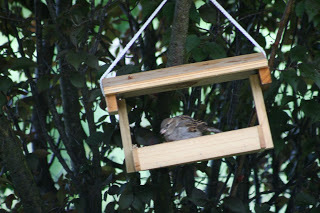
The two of them seem to share quite well, and you can just see the red-brows for which the finch is named.
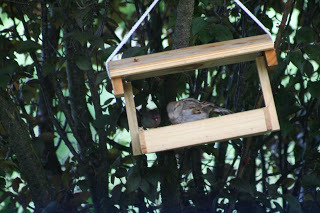
He looks even better, on his own.
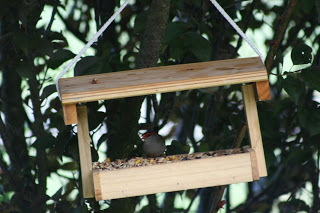
And doesn't seem to mind the camera at all.
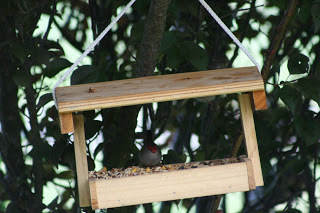
The sparrow returns, but the finch is not intimidated. You can see the red markings on his rump that give him the name 'red-browed firetail'.
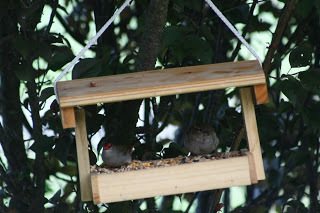
The two dine quite companionably, and the finch turns a little more so we can get a better look at the tail markings.
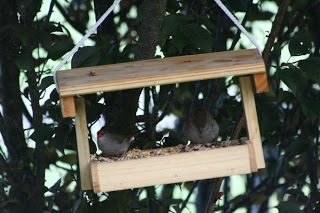
Here's another angle showing his face mask and beak.
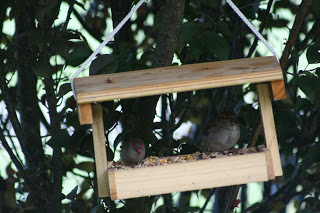
And then he turns side-on to get a better look at the camera.
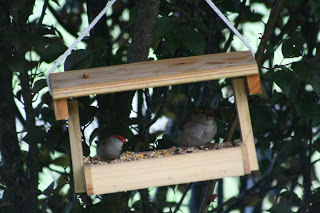
Fortunately, he figures I'm not a threat, and hops for more seed.
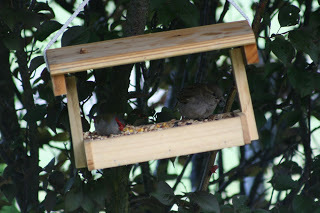
The sparrow follows his example, and it looks like they're having a picnic together. This went on for a good half hour, before they moved on to other pastures.
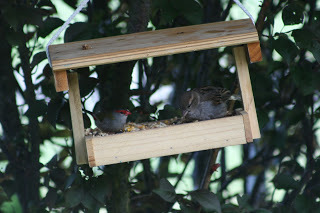
More Information on Red-Browed Finches can be found at:
https://en.wikipedia.org/wiki/Red-bro...
Just so you know, this is NOT a red-browed finch - although there is one in the background; the bird in front is a young female sparrow.

The two of them seem to share quite well, and you can just see the red-brows for which the finch is named.

He looks even better, on his own.

And doesn't seem to mind the camera at all.

The sparrow returns, but the finch is not intimidated. You can see the red markings on his rump that give him the name 'red-browed firetail'.

The two dine quite companionably, and the finch turns a little more so we can get a better look at the tail markings.

Here's another angle showing his face mask and beak.

And then he turns side-on to get a better look at the camera.

Fortunately, he figures I'm not a threat, and hops for more seed.

The sparrow follows his example, and it looks like they're having a picnic together. This went on for a good half hour, before they moved on to other pastures.

More Information on Red-Browed Finches can be found at:
https://en.wikipedia.org/wiki/Red-bro...
Published on November 29, 2015 13:19
November 28, 2015
Progress Report: Week 4, 22-28 November, 2015
An interesting week, starting with a doctor’s appointment and ending with a mild dose of sunburn, but a feeling of wellness I haven’t had in a while. Exercise, folks, is more than worth the time you spend on it. Of course, this disrupted all routines and I didn’t manage to maintain my writing, but I’ll do better this week. I’ve flunked NaNo again this year, I think, but I learned a lot (see the post coming on Tuesday), and it was time well spent. My life is changing, but it’s not without its challenges.
Overview
New words produced: 3,297Old words revised: 0Outlines and Notes: 1,314Works completed: 0Works revised: 0Covers created: 0Works published: 0Works submitted: 5Competitions Entered: 0Bloggery: 4,492University Prep and Assignments: 0
Back-on-Track Challenge:
Design covers for, edit, format, and upload the following:
Nil
Finish
Nil
New Writing
Nil
Publishing Tasks
Created 5 blog posts for this blog;Created 2 blog post for the C.M. Simpson Art and Photography blog;
New Arrivals
Nil
Published on November 28, 2015 14:13
November 24, 2015
Poetry Challenge: The Sonnet
Because we all love Shakespeare, right?
Of course, we do, since he was the master. So, sonnets.
Sonnet basics:
The Shakespearean sonnet is also called the English sonnet;Each line has five pairs of syllables, and every second syllable is stressed - this is called an iambic pentameter; The sonnet is divided into three verses of four lines;There is a rhyming scheme: abab cdcd efef (meaning the last word of the first line of each verse rhymes with the last word of the third, and the end of second line rhymes with the end of the fourth);There are two more lines at the end of the poem, after the third verse;These last two lines end with words that rhyme with each other: gg.Notes on Writing:
I found this incredibly hard to write, and I'm not sure the iambic pentameter is perfect, but everyone has to start somewhere. I wish you good luck with yours.
Example Sonnet:
"Do not laugh at me," roared my inner ghost
"Keep me secret. Keep me safe. Tell you none,
or I will make you mourn your soul, my host.
From me you cannot hide. You cannot run."
"Oh ghost of mine," I said, "leave me alone."
"Never!" it replied, "You're forever mine."
"We'll see," I said, and raised the telephone.
"Crusaders of Canb'ra? Please come in time."
They soon came, but the wicked ghost took hold.
It did not want to leave me. How I raved!
A ghostly fever raged, then left me cold.
The ghost, it fled. My soul was safe and saved.
I joined the ranks of the crusaders bold.
To the One they served, my own soul I sold.
More information:
Google "Shakespearean sonnet" or check out these sites:
http://www.creative-writing-now.com/how-to-write-a-sonnet.htmlhttps://en.wikipedia.org/wiki/Sonnethttp://www.sonnets.org/basicforms.htm
Of course, we do, since he was the master. So, sonnets.
Sonnet basics:
The Shakespearean sonnet is also called the English sonnet;Each line has five pairs of syllables, and every second syllable is stressed - this is called an iambic pentameter; The sonnet is divided into three verses of four lines;There is a rhyming scheme: abab cdcd efef (meaning the last word of the first line of each verse rhymes with the last word of the third, and the end of second line rhymes with the end of the fourth);There are two more lines at the end of the poem, after the third verse;These last two lines end with words that rhyme with each other: gg.Notes on Writing:
I found this incredibly hard to write, and I'm not sure the iambic pentameter is perfect, but everyone has to start somewhere. I wish you good luck with yours.
Example Sonnet:
"Do not laugh at me," roared my inner ghost
"Keep me secret. Keep me safe. Tell you none,
or I will make you mourn your soul, my host.
From me you cannot hide. You cannot run."
"Oh ghost of mine," I said, "leave me alone."
"Never!" it replied, "You're forever mine."
"We'll see," I said, and raised the telephone.
"Crusaders of Canb'ra? Please come in time."
They soon came, but the wicked ghost took hold.
It did not want to leave me. How I raved!
A ghostly fever raged, then left me cold.
The ghost, it fled. My soul was safe and saved.
I joined the ranks of the crusaders bold.
To the One they served, my own soul I sold.
More information:
Google "Shakespearean sonnet" or check out these sites:
http://www.creative-writing-now.com/how-to-write-a-sonnet.htmlhttps://en.wikipedia.org/wiki/Sonnethttp://www.sonnets.org/basicforms.htm
Published on November 24, 2015 09:30
November 23, 2015
Writing and Publishing: Finding the Balance
The Back-on-Track Challenge and the last university semester have taught me that I have some balancing to do in order to make all the bits of my life fit. Being a full-time student, and wanting to achieve good grades is a full-time job, and that means that, during semester, my writing can’t be. This has meant that I haven’t been making regular releases and that I’ve been expecting too much of myself as a writer, so I’ve had to make a few changes.
The first of these is that I had to revamp my writing schedule to take some of the pressure down. Instead of aiming at a release a week, I’m aiming at having a release every 2nd month, starting in January 2016. It also means that I can’t keep working on a ‘backlog’, but that I have to work out how to move forward with what I have, and then to keep moving forward as I keep writing. To do this, I did the following:
I rescheduled all the work I’d completed, with the first release coming out in the first week of January. This gave me completed work to release all the way up to July, and partial work that will take me through to May 2017 with releases becoming monthly as of January 2017 (or, that’s the plan).I put in place a publishing plan, to help make sure I meet my publishing needs for pre-releases;and I planned a writing schedule that would allow me to fill the gaps, while keeping the release schedule on track.
The second thing I realised I needed to do was to get this blog, and my publishing and photography blogs on track. For now, I’m focussing on this blog, but I have ideas for keeping the other two a little better updated:
Once I have the items for publishing schedule for the first six months uploaded and available for pre-release, I will release that schedule to the publishing blog;Each cover completed will go to the publishing and art blogs;I will pre-plan the entries for this blog so that there is something up at lease every second day. So far, I’m thinking on keeping the Sunday Progress Reports, making Monday Birds and Bugs, switching the poetry challenge to Wednesdays, and to try for the Friday RPG writing or news or playing reports. I might try for a regular Writing post, and the terribleminds flash fiction challenge on two of the other days. Publishing and cover announcements will be extra posts.
The third thing I realised was that I had to work on my fitness. Basically, you can’t write any novels when you’re dead… or not well, so fitness is important. Diabetes, high blood pressure, stress and so on, are all reduced with an increased fitness, so, now, I’m walking twice a day most days.
Apparently, there’s this thing called life-balance, and I’m a long way off being there. That’s the goal for the Christmas break – establish a better life-balance. A better life-balance can only mean a better writing balance, right?
Published on November 23, 2015 09:30
November 22, 2015
Birds and Bugs... And Butterflies
It's late spring in Australia - the last month of spring, to be exact, so I thought I'd share a couple of butterflies that came to visit.
At first glance, they don't look like much... and they're fairly well camoflauged.
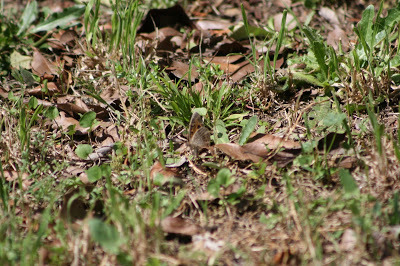
And then they start to open their wings, and we see a flash of promise.
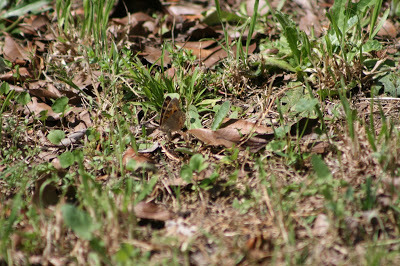
If we shift the angle, just a little bit...
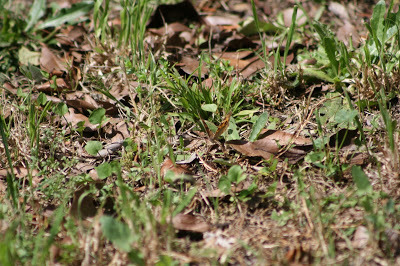
We saw more of the colour hidden inside
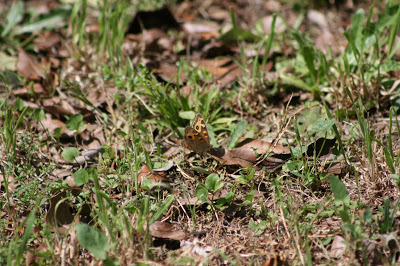
And then a little more...
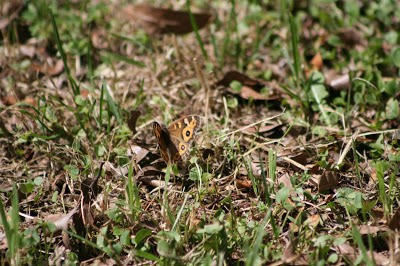
Until the butterfly reveals its true colours...
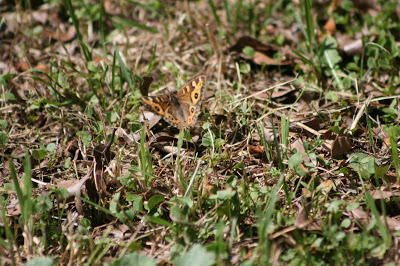
...and then it flies away.
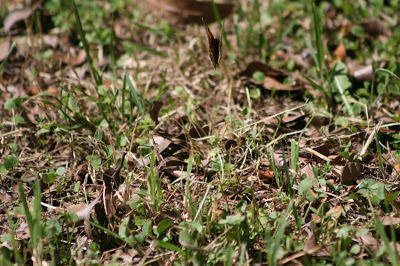
At first glance, they don't look like much... and they're fairly well camoflauged.

And then they start to open their wings, and we see a flash of promise.

If we shift the angle, just a little bit...

We saw more of the colour hidden inside

And then a little more...

Until the butterfly reveals its true colours...

...and then it flies away.

Published on November 22, 2015 09:30



